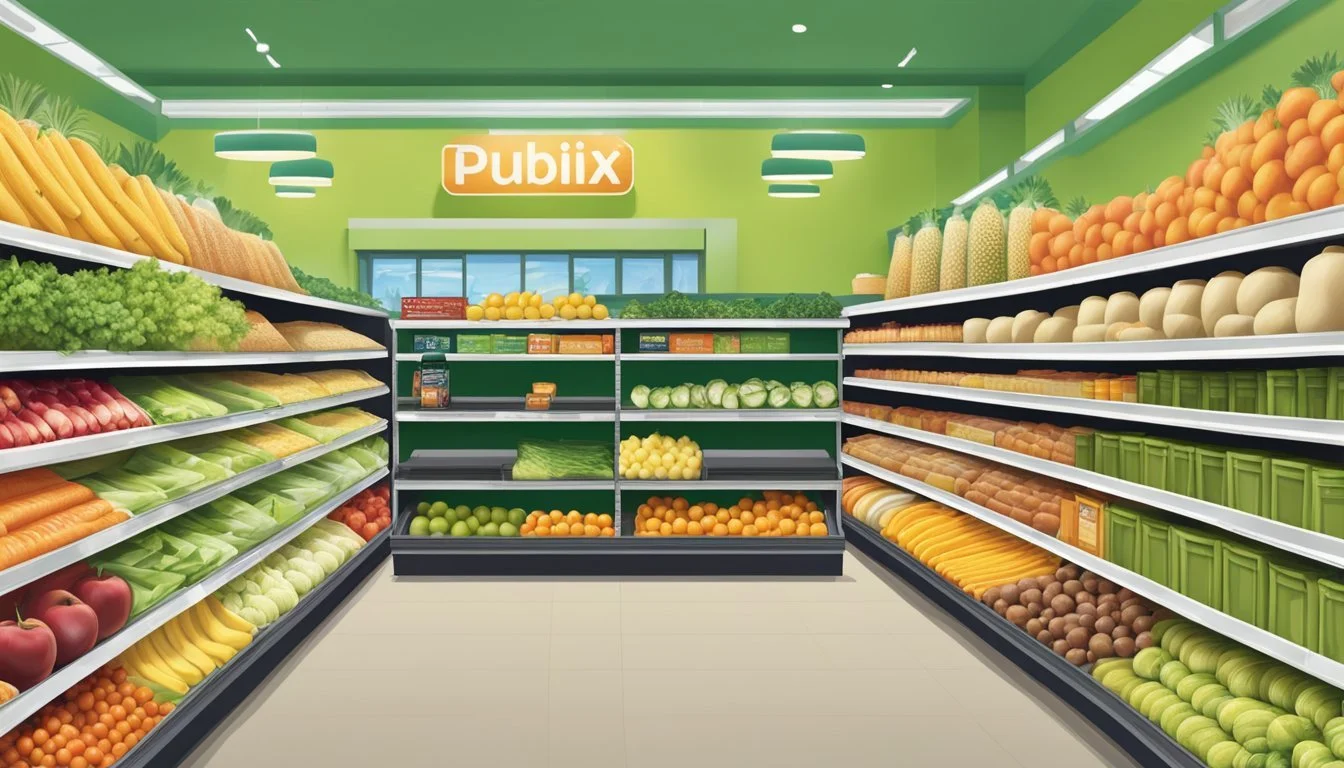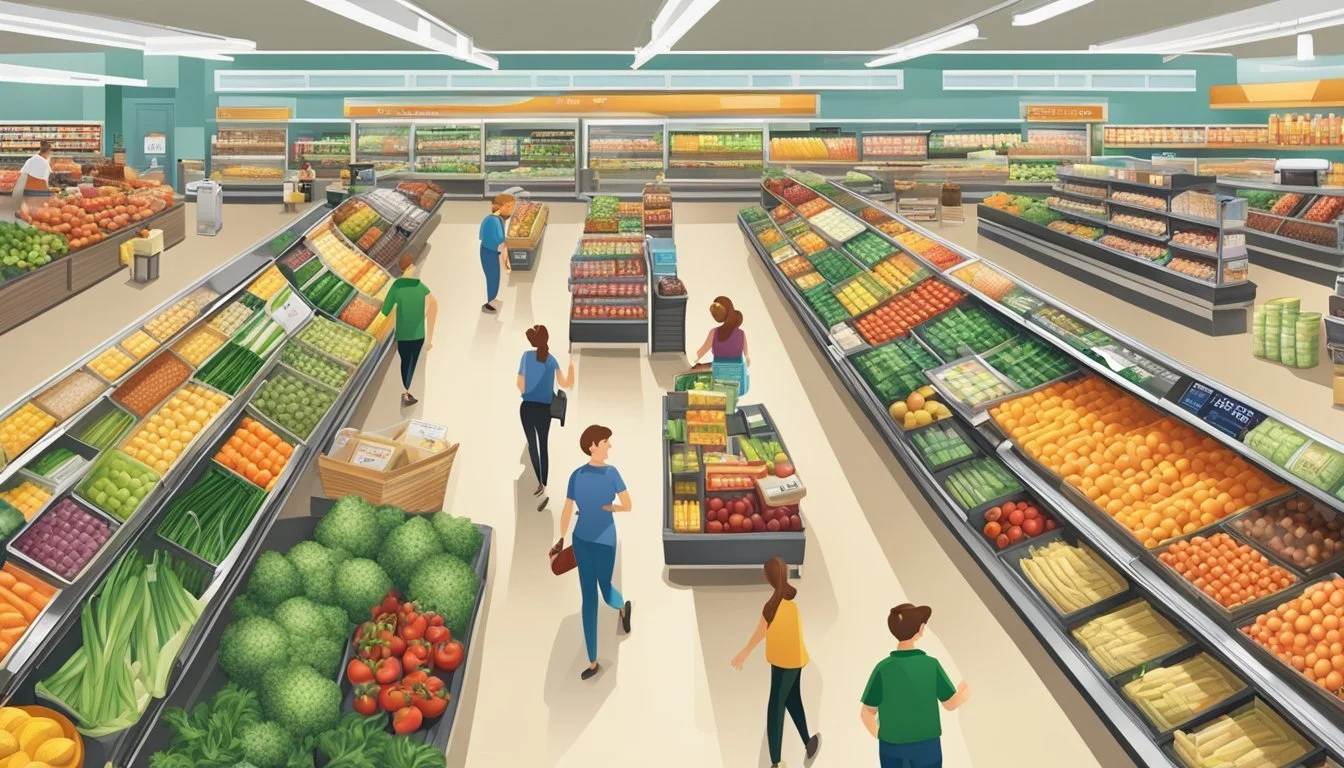Publix vs Aldi
Comparing Prices, Quality, and Shopping Experience
When comparing grocery stores, shoppers often weigh the balance between cost and quality. Aldi and Publix are two prominent players in the American grocery sector that have garnered attention for differing reasons. Aldi, a German discount supermarket chain, has built a reputation for its cost-effective pricing strategy, which often beats competitors across various product categories. Its business model is streamlined, focusing on store-brand products, minimalistic store design, and an efficient checkout process.
Publix, on the other hand, is an employee-owned, American supermarket chain known for its commitment to customer service, clean stores, and wide selection of products, including its own brand of goods. While Publix is generally perceived as more expensive than Aldi, it is celebrated for an extensive range of products and amenities, such as on-site bakeries, delis, and prepared foods, which enhance the shopping experience. Both Aldi and Publix have their own strengths—Aldi in its pricing and Publix in its customer service and store experience.
Nevertheless, the determination of which grocery store is "better" is not straightforward and can depend on individual shopper priorities. If price is the paramount concern, Aldi's low-cost approach offers undeniable value. In contrast, for those who prioritize a broader selection and a more traditional shopping experience, Publix may be the preferred choice, despite a higher price point on some items. Thus, defining "better" necessitates a consideration of both cost savings and shopping experience, and the decision will vary based on personal preferences and priorities.
History and Overview of Aldi and Publix
The histories of Aldi and Publix provide a rich context for understanding their positions in the competitive supermarket industry. This section delves into the distinct beginnings and the progressive growth of these two supermarket giants.
Aldi's Origins and Expansion
Aldi's story began in 1913 when Karl Albrecht Sr. established a small store in Essen, Germany trading in baked goods. By 1946, his sons, Karl and Theo Albrecht, took over the business, and eventually, in the 1960s, split it into Aldi Nord and Aldi Süd due to a dispute over tobacco sales. The Aldi brand, known for its low-cost, high-efficiency approach, has since expanded beyond Germany to become a global presence. As of now, Aldi operates in many countries worldwide, maintaining its reputation for providing customers with some of the lowest prices in the supermarket sector.
Publix's Founding and Growth
Founded in 1930 by George W. Jenkins, Publix Super Markets, Inc. started as a single store in Winter Haven, Florida. Unlike Aldi's austere approach, Publix built its brand on a foundation of customer service, cleanliness, and product quality. The Florida-founded supermarket has shown impressive growth, eventually becoming the largest employee-owned grocery chain in the United States. Publix has expanded its operations primarily in the southeastern region of the country, continually focusing on enhancing the shopping experience and offering a wide variety of goods, including premium items not typically found in discount-oriented stores like Aldi.
Store Brands and Product Range
Choosing between Aldi and Publix often comes down to the balance between product variety and value. Each store offers its unique range of store brands which cater to different consumer needs, from product selection to organic produce offerings.
Aldi's Exclusive Brands
Aldi carries a variety of exclusive store brands that emphasize affordability without compromising on quality. They manage to keep their prices competitive by offering a curated selection of products that fall under their own labels. Shoppers will find a range of categories including fresh produce, pantry staples, and organic options. One of Aldi's strengths is its commitment to offering a robust selection of organic produce and eco-friendly products under its own brands, such as Simply Nature.
Simply Nature: Focuses on organic and non-GMO products.
Specially Selected: Offers gourmet and specialty items.
LiveGFree: Caters to gluten-free requirements.
Publix Brand Range
Publix presents a vast array of store brand products that span numerous categories, asserting a commitment to variety and quality. Their store brand encompasses both basic and premium options. Within Publix's product range, consumers have access to a broader assortment, including an ample selection of deli items, bakery goods, and ready-to-eat meals. They are known for providing a substantial variety of products, giving special attention to the quality and freshness, especially with their Publix GreenWise line which is focused on health-conscious and environmentally friendly products.
Publix Brand: The standard product line that combines quality and value.
Publix GreenWise: Offers a range of organic and natural products.
Publix Premium: Includes a selection of high-end goods and specialty items.
Pricing Strategies
In the competitive grocery market, Aldi and Publix have distinct pricing strategies that attract different customer segments. While Aldi focuses on a low-price model known for heavy discounts, Publix adopts a more varied approach with a mix of competitive pricing and promotional deals.
Understanding Aldi's Low-Price Model
Aldi maintains low prices through a streamlined store operation that emphasizes efficiency and product turnover. Aldi's pricing strategy includes:
Limited Selection: Offering a curated selection of primarily store-brand products, allowing for bulk purchases and lower prices.
No-Frills Store Design: Simple store layouts and minimalistic shelving reduce overhead costs.
Efficient Staffing: Smaller stores require fewer employees, contributing to lower operational costs.
By focusing on these cost-saving measures, Aldi ensures savings are passed on to consumers, often undercutting competitors on staple items. The savings can be substantial, with Aldi's prices being lower than Publix by significant percentages across various product categories.
Publix's Approach to Pricing
In contrast, Publix's pricing strategy is multifaceted, combining competitive pricing with a strong emphasis on customer experience and value-added services. Publix's key pricing strategies include:
Weekly Specials and BOGO Deals: Leveraging discounts through "Buy One, Get One Free" offers and weekly specials to provide savings.
Coupon Policies: Encouraging the use of manufacturer coupons and occasionally offering store coupons to extend discounts to customers.
Despite often higher baseline prices compared to Aldi, Publix competes by providing a broader array of products, including premium and organic lines, which can appeal to a different market. Their deals and loyalty programs are tailored to ensure that customers feel they receive value for their money, even if they aren’t always getting the lowest price.
Quality and Selection of Goods
In comparing Aldi and Publix, one finds distinctions in both quality and selection of goods offered. Each store has tailored its approach to catering to customer expectations, focusing on different aspects of quality and variety.
Aldi's Product Quality and Selection
Aldi's shelves often showcase a range of quality meats, dairy, and eggs, with a lean towards more organic and private-label options, reflecting their commitment to make these healthier choices affordable. Their selection, while curated, covers the essentials across bread and produce, with an emphasis on cost-effectiveness without compromising the quality of the items.
Meat: Choice of meats at competitive prices.
Dairy and Eggs: A selection often includes organic options.
Bread: Staple varieties present, including whole grain options.
Produce: Freshness highlighted, with seasonal goods frequently in rotation.
Publix's Commitment to Quality
Publix prides itself on providing a wide variety of goods, including an expansive range of meat, dairy, eggs, fresh produce, and bread. It emphasizes quality and freshness, with many stores offering an array of premium and specialty products alongside regular items.
Meat: A diverse collection, from standard cuts to gourmet selections.
Dairy and Eggs: Extensive selection, with a focus on local and high-quality options.
Bread: An extensive array of bakery items, from artisan to classic loaves.
Produce: Rigorous quality control ensures the freshness and variety of fruits and vegetables.
Customer Shopping Experience
When customers enter a grocery store, they anticipate a shopping environment that caters to their convenience and comfort. Two prominent grocery chains, Aldi and Publix, approach the shopping experience with distinct models that reflect their respective brand philosophies.
In-Store Experience at Aldi
Aldi stores are designed with efficiency in mind. Their no-frills layout streamlines the shopping process, with goods often displayed in their original packaging to save time and labor. Customers benefit from shorter aisles and a smaller store footprint, which makes for quick and easy navigation. Aldi's Checkout process is notably swift, with a conveyor belt system designed for rapid scanning and bagging. However, Aldi does require customers to deposit a quarter to use a shopping cart and bring their own bags or purchase them at checkout, contributing to their cost-saving approach.
Publix's Store Ambiance and Services
Conversely, Publix emphasizes a warm and inviting shopping experience. Their stores typically feature wider aisles, a well-organized layout, and a diverse selection of products, including an extensive deli with made-to-order services. Publix's commitment to customer service is evident, with associates readily available to assist shoppers and provide a personalized touch. The location of Publix stores is often strategic, establishing a presence in easily accessible and upscale neighborhoods. Publix's Checkout experience may be slightly less efficient than Aldi's, but it includes baggers who assist in packing groceries, enhancing the customer service aspect of the shopping experience.
Promotional Deals and Savings
When searching for savings at grocery stores, one often looks to special offers and promotional deals. Good understanding of these can lead to substantial savings on grocery bills.
Aldi's Special Buys and Discount Events
Aldi is renowned for its Special Buys—limited-time sales on a diverse range of products that change weekly. These deals often encompass more than groceries, extending to items like electronics and home goods, which invite customers to consistently find new discounts. In addition to these rotating specials, Aldi offers Discount Events, which may snag shoppers greater savings with slashed prices on certain categories of goods. The emphasis is on getting considerable discounts without the need for coupons.
Publix's Weekly Specials and BOGO Deals
Publix counters with their attractive Weekly Specials and BOGO (Buy One, Get One Free) deals, which customers can find in their weekly ad. These specials tend to span across various departments, enabling shoppers to save on staples and splurge items alike. Publix further enhances savings opportunities with coupons that can be found in-store, online, and through the Publix app, making it easy for customers to save on top of already reduced prices. Greater savings can be achieved through strategic purchasing when combining these weekly deals with coupons.
Market Presence and Locations
The competitive landscape in the grocery sector is largely influenced by the market presence and expansion strategies of major players. Aldi and Publix, two prominent supermarket chains, offer stark contrasts in their geographical footprint and target markets.
Aldi's Geographical Footprint
Aldi has demonstrated a robust expansion plan, projecting the opening of 800 new stores by the end of 2028. This move signifies their increasing market presence, especially in the United States, where they have a notable annual sales figure of approximately $27 billion. As a discount grocer, Aldi's strategy aggressively positions them against the competition, aiming to increase their grocery retail market share, which currently stands around 2.1%.
Location: National with emerging global presence
Target Market: Budget-conscious shoppers
Competition: Direct competition with other discount stores and supermarket chains
Expansion: Aggressive national growth with a specific plan to open new stores
Publix’s Store Locations
Publix, traditionally rooted in the Southeast, maintains dominance particularly in Florida. With more than 300 separate liquor shop locations in addition to its supermarkets, Publix caters to a diverse consumer base, contrasting Aldi's generally uniform store offering. Despite its regional focus, Publix competes directly with Aldi and other national supermarkets by offering a mix of affordability and premium products.
Location: Concentrated in the Southeast, notably Florida, with expansion into new regions like Kentucky
Supermarket Focus: Variety in product offerings, including liquor stores
Target Market: A mix of budget and premium consumers
Florida Presence: Strong, with the majority of its liquor stores located within the state
Mississippi Expansion: Not mentioned in the available information
These strategic differences in market presence and location underscore the distinctive approaches Aldi and Publix are taking to capture their respective target markets and expand their influence within the competitive grocery landscape.
Brand Reputation and Customer Perceptions
Publix and Aldi, two prominent names in the grocery store industry, have cultivated distinct reputations among consumers. Regarding brand reputation, Publix has positioned itself as a store that emphasizes customer service, quality, and a pleasant shopping atmosphere. This consistent consumer experience has engendered loyalty, with Publix seen as a more traditional and comprehensive grocer, often lauded for its bakery and deli sections.
In contrast, Aldi is often recognized for its frugality and no-frills approach to grocery shopping. Aldi's reputation is firmly rooted in its promise of offering some of the lowest prices on the market, a factor that significantly appeals to cost-conscious shoppers. The store's layout, brand selection, and presentation are designed with efficiency in mind, which helps to keep prices low.
When it comes to customer perceptions:
Publix is generally perceived as a higher-cost option but justifies this with superior product variety and customer service.
Aldi attracts customers with its deeply discounted prices and simplicity, but it may offer a more limited product range in comparison.
As competitors, both stores have significant brand awareness in their markets. YouGov's findings suggest Publix has an 88% brand awareness level, with Aldi close at 84%, indicating both stores have strong visibility among consumers. Factors such as in-stock availability, order fulfillment, and clear pickup instructions contribute to their customer perceptions, with both chains having robust strategies for online ordering and pickup as evidenced by reports from industry analysts like Ipsos.
Publix: excels in customer service and store environment.
Aldi: champion of affordability and efficiency.
Environmental and Social Responsibility
When considering the environmental and social responsibility of grocery stores, Aldi and Publix have taken significant strides. Aldi focuses on sustainability initiatives, while Publix emphasizes community involvement and charitable efforts.
Aldi's Sustainability Initiatives
Aldi has implemented several sustainability initiatives with a focus on reducing waste and environmental impact. Sustainability is a key factor in Aldi's operations, with efforts to minimize waste through a comprehensive recycling program and initiatives to lower energy usage across stores. Aldi's commitment to reducing its carbon footprint is evident in its selection of energy-efficient lighting and refrigeration systems. Moreover, the chain is known for its rigorous standards in sourcing products, ensuring a lower environmental impact from its supply chain.
Publix and Community Involvement
Publix has built a strong reputation on its extensive community involvement. Its corporate social responsibility extends to significant donations to local and national causes, and the company is actively engaged in various charitable initiatives. Through financial contributions, food donations, and campaigns like supermarket food drives, Publix demonstrates its commitment to the community. Additionally, Publix releases an annual Sustainability Report, highlighting its progress and goals related to environmental responsibility, showing its dedication to creating a positive impact on both society and the planet.
Conclusion: The Better Grocery Store for You
When it comes to choosing between Publix and Aldi, the decision largely rests on individual priorities. Aldi is recognized for its cost-effectiveness, often offering lower prices across a wide range of products than Publix. Customers looking to stretch their grocery budget might prefer Aldi, especially if they value savings above all else.
Publix, on the other hand, has a reputation for quality and customer service. It tends to have a wider variety of branded items and a larger selection of specialty goods. For shoppers for whom a pleasant shopping experience and product choice is paramount, Publix might be the favored option.
In terms of grocery shopping, Aldi's straightforward layout and smaller selection can make for a quicker shopping trip. However, Publix tends to offer a more comprehensive shopping experience, with a broader range of services and amenities.
Here is a quick comparison:
Prices: Aldi typically offers lower prices.
Quality: Publix often has a broader selection of high-quality goods.
Shopping Experience: Publix provides a more traditional supermarket experience with additional services.
Ultimately, consumers must weigh these factors against their personal needs and preferences. Those prioritizing budget-friendly shopping might lean towards Aldi, while those who place a higher value on quality, variety, and customer service may find Publix to be the better fit.








